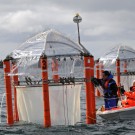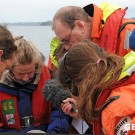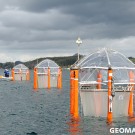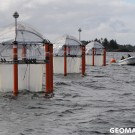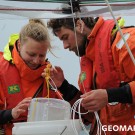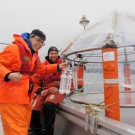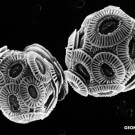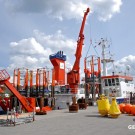21 July 2015 / Bergen, Kiel. In a two-months long experiment in Norway, scientists from GEOMAR Helmholtz Centre for Ocean Research Kiel investigated how ocean acidification affects the plankton community and material fluxes within the marine food web. Their observations confirm that positive and negative effects have to be expected. Among the losers are the […]
Top predators
In KOSMOS science meetings, information about the different levels of the food web are normally presented in succession from the smallest to the largest individuals. Last time, after we had talked about the pico-eucaryotes, phytoplankton, zooplankton, apendicularians and fish larvae, I was asked about the journalists. And I like thinking of them as top predators […]
KOSMOS 2015 presentation at IMR
What’s going on at the Espeland Marine Biological Station? What are these orange constructions in the Raunefjord for? And why do we have to care about ocean acidification? In his Hjort Guest Lecture, Prof. Ulf Riebesell from GEOMAR gives a brief overview of the present state of knowledge about ocean acidification, highlights some deficits in […]
No matter the weather
A fresh northwesterly breeze blew away the rainclouds this morning and made today’s sampling a bit challenging. But everyone returned cheerfully and hungry enough for an early lunch…
Back in the Fjord
“Back in the Fjord”: We discussed the title of our press release at length. Admittedly, we had come up with more appealing titles for previous experiments. But it fits. Oh, yes, it fits! The KOSMOS gang is back at the fjord, this time accompanied by a group of highly motivated students. And how happy everyone […]
Evolution cage match
Microbes reproduce fast. Like, really fast, so that over the course of the mesocosm experiment, some species will go through about 50 generations. And in that time, evolution can happen. Team Evolution (Lisa and Sinead) are measuring how much some of the picoplankton in the mesocosms evolve. To do this, we need to measure the […]
What’s it all about?
Those of you who visit us at Oceanblogs regularly have heard about ocean acidification already – the change in ocean chemistry due to the uptake of carbon dioxide: Since the start of the industrial revolution, the ocean has absorbed approximately 30 per cent of all carbon dioxide released into the atmosphere by humans, for examply by […]
Almost ready to go
The KOSMOS 2015 team is almost ready to go! The mesocoms and the working boat WASSERMANN were loaded on the research vessel ALKOR today. An extra truck will take dozens of boxes with lab equipment, measurement instruments, anchors, buoys and sampling material to Bergen. Weather forecasters told us that ALKOR might have a rough time […]
Please stay tuned…
We are busy setting up this blog. Please return later – thanks for your patience! To find out more about ocean acidification in the meantime, check these sites: BIOACID: http://www.bioacid.de Ocean Acidification: http://ocean-acidification.net
